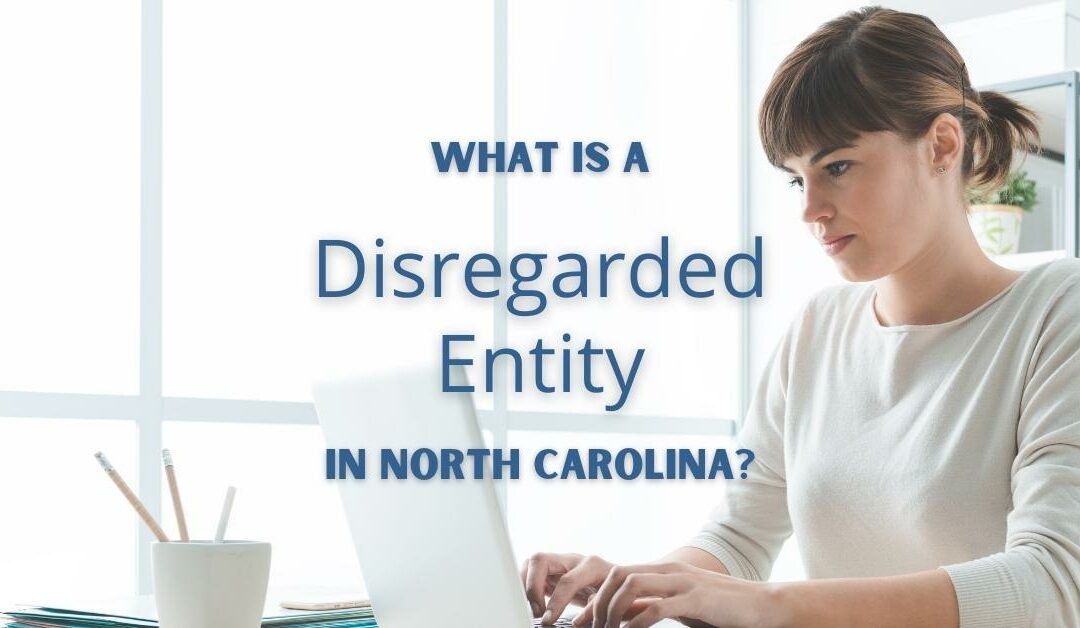What is a disregarded entity? In the most basic sense, it is a business type that the federal government ignores for tax purposes. The most common disregarded entity for federal income tax purposes is the single-member limited liability company (SMLLC). Let’s look at what a disregarded entity is in North Carolina and the benefits of forming one.
What Is a Disregarded Entity in North Carolina?
A disregarded entity is an LLC with only one owner. For federal income tax purposes, the IRS disregards the LLC and taxes the owner as if they were operating as a sole proprietor. Facing taxation as a single proprietor means that there’s only one level of taxation (at the individual level) and no need to file a separate return for the LLC.
There are some essential things to keep in mind if you’re thinking about forming a disregarded entity in North Carolina. First, while the IRS will disregard the LLC, the state of North Carolina will still consider your LLC a separate legal entity. A single-member LLC in NC has its own legal identity in our state. It can enter into contracts, sue or be sued, and face liability for its own debts and obligations.
Multi-Member LLC Filing Federal Taxes in North Carolina
If your LLC has at least two members, it is automatically a partnership for federal income tax purposes. With more than one member, your LLC is not a disregarded entity in NC. However, as a multi-member LLC, you can elect corporation status by filing IRS Form 8832.
Single-Member LLC Filing Federal Taxes in North Carolina
You can also elect corporation status for Federal tax purposes as an SMLLC owner. An LLC with only one member is a disregarded entity unless it files Form 8832 and elects corporation status.
However, even if you file taxes as a disregarded entity, you still must pay employment tax and certain excise taxes. While your company income will only be taxed once as a disregarded entity, you will still need to file multiple tax forms as a single-member LLC. You may need these forms to file your Federal taxes:
- Form 1040 or 1040-SR Schedule C, Profit or Loss from Business (Sole Proprietorship)
- Form 1040 or 1040-SR Schedule E, Supplemental Income or Loss
- Form 1040 or 1040-SR Schedule F, Profit or Loss from Farming
An individual owner of an SMLLC that operates a trade or business faces self-employment taxes just like a sole proprietorship. And that can feel stressful, considering the “self-employment tax rate is 15.3%. (12.4% for Social Security up to an annual income ceiling above which no tax applies and 2.9% for Medicare with no income limit or ceiling.” (2)
What are the Benefits of Forming an SMLLC Disregarded Entity?
There are a few reasons why you might want to consider forming a disregarded entity in North Carolina. One reason is that it can save you money on taxes. As we mentioned before, because there’s only one level of taxation (at the individual level), you may end up paying less in taxes overall.
Another reason to form a disregarded entity is for liability purposes. Remember, even though the IRS will disregard the LLC, it’s still considered a separate legal entity in North Carolina. Having LLC status in NC means you don’t need to worry about your personal assets if someone sues the LLC or if the LLC incurs debt.
To sum up the benefits of forming an LLC disregarded entity, consider:
- Saving on Taxes: As an LLC in NC, you pay taxes to the state of NC as an LLC. However, the Federal government ignores your LLC tax status and treats you as a sole proprietor for tax purposes. This treatment means you don’t face double taxation as you would if you were a corporation.
- Protecting Your Personal Assets: As an LLC, a lawsuit judgment can’t touch your personal assets such as your home, car, boat, or personal savings and retirement. However, to ensure this liability protection, it’s crucial to follow the business rules of LLCs in North Carolina. One of the most critical rules is keeping your business accounts separate from your personal accounts.
- Simplifying Record Keeping and Paperwork: As an LLC in North Carolina, you must file papers with the Secretary of State. However, the amount of paperwork and other business organizational tasks are lower than if you owned a corporation.
In some states, a husband and wife can own a disregarded entity together. However, the Federal government classifies you as a multi-member LLC in North Carolina. This status means you’re taxed as a partnership, not as a disregarded entity. Because you are not a disregarded entity, you must file a partnership tax return. (1)
We Can Help
If you’re thinking about forming a disregarded entity in North Carolina, there are a few things to keep in mind. First, make sure that you understand the tax implications. Second, remember that the LLC will still be a separate legal entity in North Carolina and can be held liable for its own debts and obligations. And finally, consult with an experienced business attorney to ensure that forming a disregarded entity is the best decision for your business.
At Hopler, Wilms, and Hanna, our experienced business attorneys can help you understand the process of forming an LLC in North Carolina and advise you on whether a disregarded entity is right for your business. Contact us today to schedule a consultation and find out how we can help!

